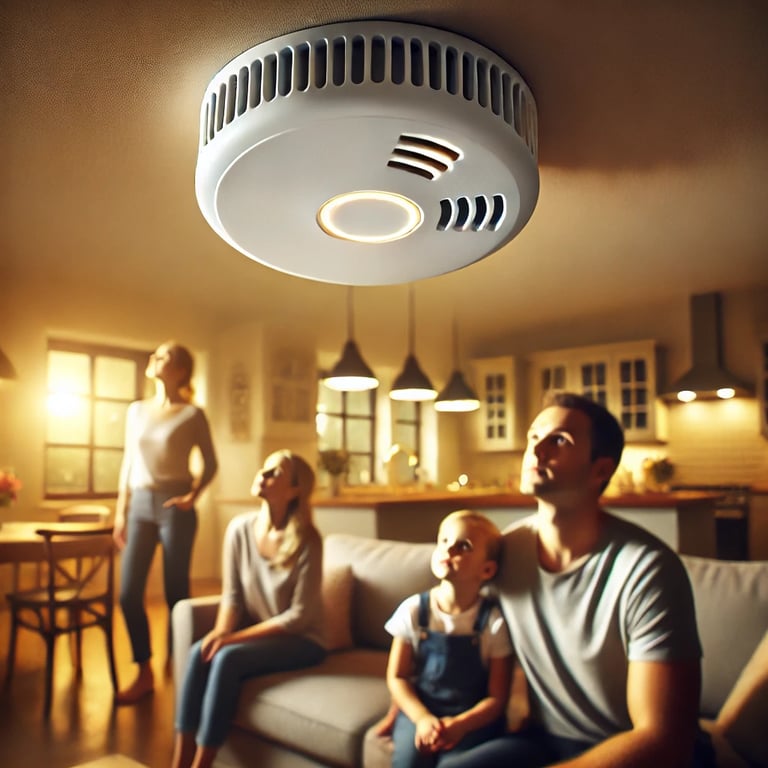The Ultimate Smoke Detector Guide: Protecting Your Home and Family


Every year, nearly 400,000 house fires occur in the U.S., resulting in between 3,000 and 4,000 deaths and countless injuries. Alarmingly, half of all house fire-related deaths happen in homes with working smoke detectors. This underscores the importance of understanding smoke detectors beyond simply checking the battery. This guide will help you ensure your smoke detectors are functioning optimally, keeping you and your loved ones safe.
Types of Smoke Detectors
Smoke detectors vary based on sensor type, power source, and smart features. Understanding these differences will help you choose the best protection for your home.
Sensor Type
There are two primary types of smoke detectors:
Ionization Smoke Detectors: These contain a small amount of radioactive material that ionizes the air, creating an electrical current between two plates. When smoke enters, it disrupts this current, triggering the alarm. These are best at detecting fast-burning, flaming fires.
Photoelectric Smoke Detectors: These use a light source and a light sensor. When smoke enters, it scatters the light beam, hitting the sensor and triggering the alarm. These are more effective for smoldering fires, which produce heavy smoke before igniting into flames.
For optimal protection, install both types or invest in a dual-sensor smoke detector, which detects both types of fires.
Power Source
There are two primary power sources for smoke detectors:
Battery-Operated: These rely solely on batteries and require regular battery replacement to remain functional.
Hardwired: These connect to your home's electrical system and typically have a backup battery to function during power outages.
A hardwired smoke detector with a battery backup is the most reliable choice, ensuring functionality even during a power failure.
Smart Features
Modern smoke detectors come with various smart features, including:
Mobile Alerts: Notifies you via smartphone in case of an alarm.
Wireless Interconnectivity: Triggers all alarms simultaneously, ensuring everyone in the home is alerted.
Location-Specific Alerts: Tells you which detector has been triggered.
Self-Testing: Automatically checks for malfunctions and alerts you if maintenance is needed.
One of the most crucial features is interconnectivity. If a fire starts in the basement while you're upstairs, interconnected alarms ensure all alarms sound simultaneously, alerting you no matter where you are.
Where to Place Smoke Detectors
Proper placement is key to ensuring smoke detectors function effectively. The National Fire Protection Association (NFPA) recommends:
Inside each bedroom
Outside each sleeping area
On every level of the home, including basements
Because smoke rises, install alarms on the ceiling or high on walls (within 12 inches of the ceiling). Avoid placing them:
Within 10 feet of cooking appliances to prevent false alarms.
At the peak of vaulted ceilings (smoke may not reach these areas quickly).
Smoke Detector Maintenance
To ensure your smoke detectors remain reliable, follow these maintenance tips:
Test monthly by pressing the test button.
Vacuum the detector annually to remove dust and debris that can interfere with functionality.
Replace batteries annually, unless you have a model with a sealed long-life battery.
What to Do If Your Smoke Detector Goes Off
A loud alarm is alarming, but knowing what to do can save lives. Follow these steps:
Stay calm and act quickly.
Alert and assist children or elderly family members.
Do not waste time gathering valuables or searching for pets.
Check doors with the back of your hand. A hot door indicates fire on the other side.
Follow your emergency escape plan.
Call 911 once safely outside.
Having an emergency escape plan, including designated exits and a meeting place, is crucial. Practice fire drills with your family regularly.
Recommended Resources and Product
For additional information on smoke detectors and fire safety, check out these resources:
Additionally, if you're looking for a reliable and affordable smoke detector, we recommend this top pick on Amazon. Many negative reviews stem from receiving units with an older manufacture date. That’s why we always check the date when obtaining our devices and avoid storing large quantities to ensure you receive the most recently manufactured models for the longest lifespan.
Final Thoughts
Investing in interconnected smoke alarms ensures that if an alarm goes off in one area of your home, the entire household is alerted. This added layer of security can be lifesaving, giving you the time you need to evacuate safely.
By understanding and maintaining your smoke detectors, you significantly increase your chances of surviving a house fire. Take action today—test your alarms, replace old batteries, and ensure your home is properly equipped to handle a fire emergency.

